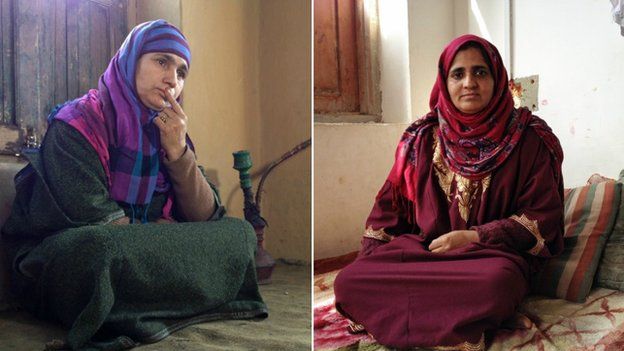Kashmir: Widows of conflict
- Published

Thousands of people have been killed in Indian-administered Kashmir since an armed rebellion against Indian rule erupted in 1989. Although the violence has declined overall since the early 2000s, the scars are still borne by the widows of the conflict. BBC Hindi's Shalu Yadav met two Kashmiri Muslim widows on the opposite sides of the conflict.
Rafiqa Malik, widow of a militant
Rafiqa Malik is the widow of a militant who died in 1993
My husband Ghulam Nabi Malik was a mason and used to earn around $3 (£2) per day. We were a happy family.
Our relationship was very loving. He loved me more than he loved his first wife.
In the 1990s, anti-India sentiment was on the rise and militancy was at its peak in the Kashmir Valley. Our village, Bandipore, had a militant in every house.
Ten years after our marriage, Ghulam disappeared one day in 1990.
After I had frantically searched for him for over a month, villagers told me that he had crossed over to Pakistan for "training".
I heard he had joined an anti-India jihad force. I sent him many messages, pleading with him to come back, but I didn't get any response.
He returned after a year, but he rarely spent any time at home.
He always kept a gun with him. He would spend weeks in the forest, for fear of being caught by the army.
I tried to convince him to leave the gun, but he would say: "I can leave you but not the gun. I picked up the gun for a cause and I will have to go ahead with it."
I even threatened to divorce him, but he wouldn't budge.
The last time I saw him was on a cold autumn night in September 1993.
He came home at midnight. Like always, we had an argument over his activities. I offered him food but he left in anger at three in the morning. After that I did not see him for 25 days.
On 25 September, he was killed by the army in a firefight.
Because I was pregnant with our fourth child, I wasn't allowed to see his body one last time.
Villagers told me that it would be ominous for the unborn child if I saw my husband's body. I was told that his whole chest was riddled with bullet wounds.
I did not support him for his cause, but I'm proud of him.
He died a martyr and was buried in a "martyrs' graveyard". People respect me in the village because of his martyrdom.
I miss him. We had promised each other never to re-marry if one of us was to die.
I have kept my promise.
Gulshan Akhtar, widow of a soldier
Gulshan Akhtar is the widow of a soldier who died in 2007
We were very young when we fell in love and got married. I was 13 and he was 17 years old.
Abdul Hamid Chara was, in fact, a militant when we got married. But soon after the marriage, he surrendered to the Indian army.
Initially, he used to help the army with information about militants. In 2003, he decided to join the army.
He always wanted a respectable job and he found one in the Indian army.
His dedication to the army was unmatchable. He would often say, "I'm ready to lay down my life for the cause of the nation."
Life is hard for a soldiers' family. Abdul used to come home only twice a year on leave.
Whenever he used to go for a raid, I would be really scared for his life.
I can never forget that night of June 2007.
I was pregnant with our fifth child and I developed some complications with my pregnancy. He took leave and rushed home.
As soon as we came back home from the hospital, he got a call from his unit, instructing him to report for work next morning.
They had received information about some militants gathering in Lolab valley and he had to join his unit for a raid.
I requested him not to leave me in that state. But he was too dedicated to his duty to listen to me.
After three days, I heard military helicopters hovering over our neighbourhood. They had brought his body.
The government awarded Abdul posthumously with a gallantry award given to soldiers for their valour.
He laid down his life for the nation and I'm proud of him. But what is the future for me and my children without Abdul?
There is glory in his death but my respect in the society is lost because I'm a widow.
Being a Muslim woman, I'm not supposed to venture out. But I have no choice. I have to manage my family and go out for chores. When I go to the market, people say nasty things behind me.
So many lives have been lost in the Kashmir conflict, but nothing has come out of it.
The only thing that this conflict has produced is widows.
The valley has thousands of widows, be it army widows or militants' widows.
Our men fight each other and lay their lives.
Does anyone think about the families they leave behind, who suffer for life?
- Published19 December 2023
- Published8 August 2019